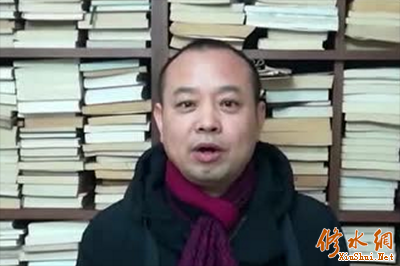近年来,中华文化“走出去”的影响力不断扩大,在全球文化多元化发展日益兴盛的背景下,中国文化译研网(CCTSS)联合中国作家协会《小说选刊》杂志社,启动“新世纪中国当代作家、作品海外传播数据库”项目,将100位中国当代优秀作家的简介、代表作品以及展示作家风采的短视频翻译为10种语言,集结成1000张中国作家名片向全球推介。千张“作家名片”将鲜明地向世界宣告:我是中国作家,我在进行中国创作。
此种形式和规模是中国故事走向世界的一大创新,会让世界更加全面、客观、公正地了解中国优秀作家作品,同时也是打通中国文化走向世界的“最后一公里”。
樊健军,男,1970年3月出生于江西省九江市修水县上衫乡王桥村。中国作家协会会员。小时候跟随祖父锄田种地,卖柴烧炭,长大后在金矿做过矿工,师范学校毕业后做过教师、记者、编过杂志,在深圳打过工。2002年开始小说创作,2011年就读于鲁迅文学院高研班,2013年入选加拿大列治文公共图书馆最受欢迎的中文小说名单。代表作有长篇小说《诛金记》《桃花痒》及小说集《水门世相》《有花出售》《空房子》《行善记》等。
樊健军的小说内容庞杂但叙述的个人气息相当分明,他大量叙写城市生存的凌乱和乡土可靠性的开裂,在身与心、人与人、城与乡、往昔和现在的相接处发现了更广阔的人性空间,这既是向往与恐惧的交汇处也是一种落脚与失足的临界点,对莫测人性有一种执拗的、连贯的追问。他的叙事带有令人紧张的探险甚至试错特质,可是在他完整有力、层次感逐渐彰显的塑形过程中,会被故事背后的荒诞、紧张与撕裂的时代感彻底打动。樊健军的小说曾受到著名作家苏童的盛赞。
长篇小说《诛金记》采用具有现代意义的叙述视角,讲述一个关于黄金财富的荒诞故事,让连天接地的风俗道统和惊心动魄的人性真相对撞糅合,深刻揭示黄金的历史发展进程的本质,以批判的态度描写黄金在转化成财富过程中与现实生活的畸型关系,从而表现岀人类在掌握自己命运的苦难历程,多方位多层次地展现当下社会人们的精神心态。系列短篇小说集《水门世相》将“食肉的”“食草的”、三百六十行的草根边缘人物集中于一个村庄,叙写他们的生存状态,展现其独特的乡村生活智慧,表面上说的是世相,骨子里却是中国乡土社会的伦理文化,这伦理文化凝聚成乡村的生存智慧之后,又反过来影响中国的伦理文化。小说集《空房子》则以女性视角为切入点,聚焦那些尚在挣扎中的卑微的灵魂,以细腻敏感而又摇曳多姿的细节捕捉他们刹那间的颤动,呈现他们情感的哀与欢,内心的荒芜与悲凉,将人性的深邃和光亮贯注于对此时代精神世界的思考和探索中。
2017年,樊健军的短篇小说《穿白衬衫的抹香鲸》与莫言同时获得中国作家协会《小说选刊》杂志社2017汪曾祺华语小说奖短篇小说奖。这是一篇深谙繁简之辩的小说,以“藏”为义,对童年经验的细微描摹和整个作品不予质判的纯真感伤的基调,激活了小说更加丰富多义的阐释空间,从象征层面进一步强化了小说卓越的品质。这恰好体现了樊健军对于小说创作的驾驭能力和探索精神。

Fan Jianjun
Fan Jianjun, male. Born in March 1970, in Wangqiao Village, Shangshan Township, Xiushui County, Jiujiang City, Jiangxi province. Member of the China Writers Association. In his youth he worked the land with his grandfather and sold firewood and charcoal. As an adult he worked in a gold mine, and after graduating from teacher’s college he worked as a teacher, reporter, magazine editor, and also did temporary work in Shenzhen. He began writing in 2002. In 2011 he took part in an advanced course at the Lu Xun Literary Institute, and in 2013 his name appeared on the list of the most popular Chinese novels compiled by the Richmond Public Library in British Columbia, Canada. His representative works include the novels Zhu Jin Ji and Peach Blossom Itch (Tao Hua Yang), as well as the short story collections Life at the Water Gate (Shui Men Shi Xiang), Flowers for Sale (You Hua Chu Shou), Empty House (Kong Fang Zi), and Chronicles of a Good Samaritan (Xing Shan Ji).
Although Fan Jianjun’s stories can be enormously complex, the uniquely individual spirit of his narration is very distinct. Much of his writing depicts the schism between the chaos of urban survival and the reliability of the countryside. In the connecting areas between body and mind, between individuals, between city and countryside, between past and present, we discover a broader space for human nature. This is an intersection of yearning and fear, and it is also the critical point, the difference between finding a foothold and losing one. It is a stubborn and cohesive examination of the enigmatic thing that is human nature. Fan Jianjun’s prose contains thrilling elements of exploration, even sometimes utilizing a process of elimination, but in his complete process of molding a narrative, in which the layers gradually emerge, the reader is utterly moved by the absurd, tense, and painfully evocative sense of the setting behind the story. Fan Jianjun’s books have also earned the praise of award-winning writer Su Tong.
Fan Jianjun’s novel Zhu Jin Ji uses a modern narrative perspective to tell a fantastical tale about gold and wealth. The book blends customs and traditions with the shocking truth of human nature, revealing the essence of gold, its history, and its development. Adopting a critical attitude, it depicts the contorted relationship between the process of the transformation from gold to wealth, and its relationship to reality. In the process of doing so, it conveys the painful course of events that occurs when someone takes control his or her own fate, presenting the current mentality of the individuals of modern society in a diverse and multi-layered manner.
Life at the Water Gate, Fan Jianjun’s serialized collection of short stories, creates “carnivores,” “herbivores,” and peripheral grassroots characters of all walks of life and places them in a single village. The work depicts their state of existence while also presenting the unique ingenuity of their rural way of life. On the surface, Fan Jianjun is simply depicting the way of the world, but running through these characters’ veins is the ethical culture of rural Chinese society. Once this ethical culture of ethics has crystallized into survival wisdom, it then conversely impacts China’s culture of ethics.
Unlike the works discussed above, the short story collection Empty Home utilizes a female perspective. Empty Home focuses on humble souls in the midst of struggling. Through its acutely sensitive yet elegant details, it captures these souls’ every quake and tremble, presenting their joys and sorrows, as well as the desolation and dismal gloom inside their hearts. This book takes human nature’s dark and bright parts alike, and it concentrates these things into a rumination on, and exploration of, the spiritual world of the modern era.
In 2017, Fan Jianjun’s short story “Sperm Whale in the White Shirt” (Chuan Bai Chen Shan De Mo Xiang Jing) received the 2017 Wang Zengqi Chinese Short Story prize, which was presented by the China Writers Association and Selected Fiction, alongside fellow recipient Mo Yan. This work deftly approaches the gap between simplicity and complexity. Taking “concealment” as a central theme, it uses the subtle portrayal of childhood experiences and its key tone of pure unadulterated sadness that runs throughout the entire novel to activate the book’s richer and broader space for interpretation, further boosting the work’s outstanding quality with a layer of symbolism. In fact, this also embodies Fan Jianjun’s exploratory spirit and his mastery of his craft.